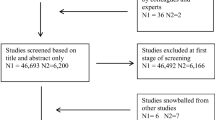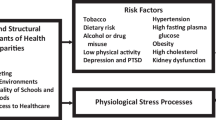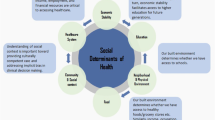Abstract
Little is known regarding how family racial structure and income intersect to produce health outcomes. We assessed infant health outcomes (weeks gestation and first year infant mortality rates (IMR)) by family racial structure (specific race group affiliation, and whether multiracial), examining the degree to which income (insurance type as proxy) interacts with family racial composition to predict infant health outcomes. This cross-sectional study utilized secondary data analysis of birth records and linked infant birth/death records spanning a 14 year period (2006–2019) for a single U.S. county. Income was dichotomized into low income and high income based upon insurance type. Race and ancestry data from infant, maternal, and paternal sources were combined into six pan-ethnic categories (Black, Asian, White, Native-American, Latino, and Middle Eastern). We used Generalized Estimating Equation to obtain the associations between a composite race x multiracial x income predictor and outcomes (infant death, weeks gestation), accounting for repeated mother births. Findings reveal that infants with Black heritage have the worst outcomes (12.34 IMR). Multiracial infants (20.5% of the population) tend to be from higher income families than monoracial minority infants. Looking further, we find that this translates to better outcomes depending on racial group and multiraciality. Multiracial higher-income Black families have substantially better outcomes (2.85 IMR) than their single Black race (12.63 IMR) or lower income multiracial peers (16.16 IMR). Single race White families also see health gains with higher income (3.60 IMR versus 6.02 IMR). Other minority race families, whether single or multiracial, see little health gain with higher income; instead, whether this group is multiracial or not is the determining feature (being single-race rather than multiracial is associated with better outcomes (0.97 IMR versus 5.39 IMR)).
Highlights
-
Questions remain regarding the pace of minority/multiracial families’ socioeconomic integration, and how race, multiraciality and socioeconomic status are linked to health.
-
Multiracial families have higher income than single race minority families, but lower income compared to single race White families.
-
Higher income is associated with better infant health for single race White families and multiracial Black families, but not for single-race Black families or other non-Black minority race families (Asian, Latino, Middle Eastern, Native American).
-
Non-Black minority race families have better outcomes if they share the same race than if they are multiracial.
-
Overall, Black race families fare the worst, with lower incomes, higher prematurity, and more infant deaths.
-
The exception to the pattern above for Black families is that Black families who are multiracial and higher -income achieve health equity (have outcomes equivalent to White-majority families).



Similar content being viewed by others
Notes
Infant mortality rate is the number of infant deaths (age under 1) per 1000 births
References
Alba, R. D., & Nee, V. (2003). Remaking the American Mainstream: Assimilation and Contemporary Immigration. Harvard University Press.
Alba, R., & Reitz, J. G. (2021). The significance of mixed family backgrounds for mainstream integration in Canada. Journal of Ethnic and Migration Studies, 47(4), 916–933. https://doi.org/10.1080/1369183X.2019.1654162.
Alba, R., & Yrizar Barbosa, G. (2016). Room at the top? Minority mobility and the transition to demographic diversity in the USA. Ethnic and Racial Studies, 39(6), 917–938. https://doi.org/10.1080/01419870.2015.1081966.
Anderson, L. M., Adeney, K. L., Shinn, C., Safranek, S., Buckner-Brown, J., & Krause, L. K. (2015). Community coalition-driven interventions to reduce health disparities among racial and ethnic minority populations (Review). The Cochrane Collaboration, (6). https://filr.med.wmich.edu/ssf/s/readFile/folderEntry/1345947/46ec14934eb4d6bd0152c272ce977aa8/1454956340000/last/communitycoalition-driveninterventionstoreducedisparity%2CCochrane%28Anderson%2C2015%29.pdf.
Aneshensel, C. S. (2015). Sociological inquiry into mental health: the legacy of Leonard I. Pearlin. Journal of Health and Social Behavior, 56(2). https://filr.med.wmich.edu/ssf/s/readFile/folderEntry/1345938/46ec14934eb4d6bd0152c2720c097a7b/1440083182000/last/SociologicalinquityintoMentalHealth-Pearlin%28Aneshensel%2C2015%29.pdf.
Avellar, S., Paulsell, D., SamaMiller, E., & DelGrosso, P. (2012). Home visiting evidence of effectiveness review: executive summary October 2012. Retrieved from Mathematica Policy Research Inc. website: https://filr.med.wmich.edu/ssf/s/readFile/folderEntry/1345941/46ec14934eb4d6bd0152c27230667a8a/1355402858000/last/HomVEE_Executive_Summary%28Avellar%2C2012%29.pdf.
Bell, C. N., Sacks, T. K., Thomas Tobin, C. S., & Thorpe, R. J. (2020). Racial Non-equivalence of Socioeconomic Status and Self-rated Health among African Americans and Whites. SSM - Population Health, 10, 100561 https://doi.org/10.1016/j.ssmph.2020.100561.
Bloome, D. (2014). Racial inequality trends and the intergenerational persistence of income and family structure. American Sociological Review, 79(6), 1196 https://filr.med.wmich.edu/ssf/s/readFile/folderEntry/1344610/46ec14934eb4d6bd01528a2ee67159ec/1451489304000/last/RacialRetrievedfrominequalitytrendsandtheintergenerationalpersistenceofincome%26familystructure%28Bloome%2C2014%29.pdf.
Bohanon, F. J., Nunez Lopez, O., Adhikari, D., Mehta, H. B., Rojas-Khalil, Y., Bowen-Jallow, K. A., & Radhakrishnan, R. S. (2018). Race, Income and Insurance Status Affect Neonatal Sepsis Mortality and Healthcare Resource Utilization. The Pediatric Infectious Disease Journal, 37(7), e178–e184. https://doi.org/10.1097/INF.0000000000001846.
Bonilla-Silva, E. (2006). Racism without Racists: Color-blind racism & the persistence of racial inequality in the United States (2nd edition). Eduardo Bonilla-Silva. Rowman & Littlefield Publishers, Inc.
Bratter, J. L., & O’Connell, H. A. (2017). Multiracial identities, single race history: Contemporary consequences of historical race and marriage laws for racial classification. Social Science Research, 68, 102–116. https://doi.org/10.1016/j.ssresearch.2017.08.010.
Bratter, J. L., & Whitehead, E. M. (2018). Ties That Bind? Comparing Kin Support Availability for Mothers of Mixed-Race and Monoracial Infants: Kin Support and Mixed-Race Families. Journal of Marriage and Family, 80(4), 951–962. https://doi.org/10.1111/jomf.12485.
Bronfenbrenner, U. (1986). Ecology of the Family as a Context for Human Development. Research Perspectives. Developmental Psychology. https://doi.org/10.1037/0012-1649.22.6.723.
Brooks, J. E., & Lynch, J. (2019). Partnering Across Race. In R. Nazarinia Roy & A. Rollins (Eds.), Biracial Families: Crossing Boundaries, Blending Cultures, and Challenging Racial Ideologies. https://doi.org/10.1007/978-3-319-96160-6.
Burton, L. M., Bonilla-Silva, E., Ray, V., Buckelew, R., & Hordge Freeman, E. (2010). Critical Race Theories, Colorism, and the Decade’s Research on Families of Color. Journal of Marriage and Family, 72(3), 440–459. https://doi.org/10.1111/j.1741-3737.2010.00712.x.
Caldwell, V. F., & Crenshaw, K. W. (1996). Critical Race Theory: The Key Writings That Formed the Movement. Columbia Law Review, 96(5), 1363 https://doi.org/10.2307/1123408.
Canales, M. (2000). Othering Toward an Understanding of Difference. Advances in Nursing, 22(4), 16–31.
Campion, K.(2019). “You think you’re Black?” Exploring Black mixed race experiences of Black rejection. Ethnic and Racial Studies, 42(16), 196–213.
Charmaraman, L., Woo, M., Quach, A., & Erkut, S. (2014). How have researchers studied multiracial populations: A content and methodological review of 20 years of research. Cultural Diversity & Ethnic Minority Psychology, 20(3), 336–352. https://doi.org/10.1037/a0035437.
Childs, E. C. (2005). Navigating Interracial Borders: Black-White Couples and Their Social Worlds. Rutgers University Press.
Coleman, M., & Ganong, L. (2014). Social History of the American Family. Sage Publications.
Colen, C. G., Geronimus, A. T., Bound, J., & James, S. A. (2006). Maternal upward socioeconomic mobility and Black-White disparities in infant birthweight. American Journal of Public Health, 96(11), 2032–2039. https://doi.org/10.2105/AJPH.2005.076547.
Cross Jr., W. E. (2012). The enactment of race and other social identities during everyday transactions. In C. L. Wijeyesinghe & B. W. Jackson III (Eds.), New Perspectives on Racial Indentity Development (Second). https://filr.med.wmich.edu/ssf/s/readFile/folderEntry/1345937/46ec14934eb4d6bd0152c271fd8a7a76/1451395215000/last/TheEnactmentofRaceandOtherSocialIdentitiesDuringEverydayTransactions_Cross_2012%28fromFernando%29.pdf.
Csizmadia, A., & White, S. (2019). Racial Identity: Choices, Context and Consequences. In R. Nazarinia Roy & A. Rollins (Eds.), Biracial Families: Crossing Boundaries, Blending Cultures, and Challenging Racial Ideologies. https://doi.org/10.1007/978-3-319-96160-6.
Davenport, L. D. (2016). The Role of Gender, Class, and Religion in Biracial Americans’ Racial Labeling Decisions. American Sociological Review, 81(1), 57–84. https://doi.org/10.1177/0003122415623286.
Diderichsen, F., Evans, T., & Whitehead, M. (2001). The social basis of disparities in health. In T. et al., Evans (Ed.), Challenging Inequities in Health. Oxford University Press, New York, NY.
Doucet, F., Hall, M. R., & Giraud, M. (2019). Parenting Mixed-Race Children. In R. Nazarinia Roy & A. Rollins (Eds.), Biracial Families: Crossing Boundaries, Blending Cultures, and Challenging Racial Ideologies. https://doi.org/10.1007/978-3-319-96160-6.
Ely, D. M., & Driscoll, A. K. (2020). Infant mortality in the United States, 2018: Data from the period linked birth/infant death file. National Vital Statistics Reports, 69(7), 1–17.
Farmer, M. M., & Ferraro, K. F. (2005). Are racial disparities in health conditional on socioeconomic status? Social Science and Medicine, 60(1), 191–204. https://doi.org/10.1016/j.socscimed.2004.04.026.
Feagin, J., & Bennefield, Z. (2013). Systemic racism and U.S. health care. Social Science and Medicine, 103, 7–14. https://doi.org/10.1016/j.socscimed.2013.09.006.
Fozdar, F., & McGavin, K. (2016). Mixed Race Identities in Australia, New Zealand and the Pacific Islands. Routledge Taylor & Francis Group.
Geronimus, A. T. (1996). Black/white differences in the relationship of maternal age to birthweight: A population-based test of the weathering hypothesis. Social Science and Medicine, 42(4), 589–597. https://doi.org/10.1016/0277-9536(95)00159-X.
Geronimus, A. T., Hicken, M., Keene, D., & Bound, J. (2006). “Weathering” and age patterns of allostatic load scores among Blacks and Whites in the United States. American Journal of Public Health, 96(5), 826.
Geronimus, A. T., Hicken, M. T., Pearson, J. A., Seashols, S. J., Brown, K. L., & Cruz, T. D. (2010). Do US Black Women Experience Stress-Related Accelerated Biological Aging? Human Nature. https://doi.org/10.1007/s12110-010-9078-0.
Gordon, M. (1964). Assimilation in American Life. Oxford University Press.
Grimshaw, P. (2014). Interracial Marriages and Colonial Regimes Interracial Marriages in Victoria and Aotearoa / New Zealand. 23(3), 12–28.
Harris, J. C. (2016). Toward a critical multiracial theory in education. International Journal of Qualitative Studies in Education, 29(6), 795–813. https://doi.org/10.1080/09518398.2016.1162870.
USAID, U.S. Agency for International Development. (2012). Healthy People 2020. 2011 USAID Annual Data Report (vol.2), e168. https://doi.org/10.1053/j.ajkd.2011.10.026.
Hubbard, A. E., Ahern, J., Fleischer, N. L., Laan, M. VanDer, Lippman, S. A., Jewell, N., & Satariano, W. A. (2010). To GEE or not to GEE: Comparing population average and mixed models for estimating the associations between neighborhood risk factors and health. Epidemiology, 21(4), 467–474. https://doi.org/10.1097/EDE.0b013e3181caeb90.
Hunter, M. (2007). The Persistent Problem of Colorism: Skin Tone, Status, and Inequality. Sociology Compass, 1(1), 237–254. https://doi.org/10.1111/j.1751-9020.2007.00006.x.
Ickovics, J. R., Kershaw, T. S., Westdahl, C., Magriples, U., Massey, Z., Reynolds, H., & SchindlerRising, S. (2007). Group prenatal care and perinatal outcomes. Obstetrics & Gynecology. https://filr.med.wmich.edu/ssf/s/readFile/folderEntry/1345943/46ec14934eb4d6bd0152c27268327a94/1454960384000/last/GroupPNC%26Perinataloutcomes-anRCCT%28Ickovics%2C 2007%29.pdf.
Johnston-Guerrero, M. P., Tran, V. T., & Combs, L. (2020). Multiracial identities and monoracism: Examining the influence of oppression. Journal of College Student Development, 61(1), 18–33. https://doi.org/10.1353/csd.2020.0001.
KD, K., SL, M., JQ, X., & E, A. (2019). NCHS, National Vital Statistics System, public-use Mortality File, public-use Birth File.
Kina, L., Dariotis, W. M., & Fojas, C. (2014). Emerging Paradigms in Critical Mixed Race Studies. Journal of Critical Mixed Race Studies, 1(1), 6–65.
Kochanek, K.D., Murphy, S.L., Xu, J.Q., & Arias, E. (2019). NCHS, National Vital Statistics System, public-use Mortality File, publicuse Birth File.
Kothari, C. L., Romph, C., Bautista, T., & Lenz, D. (2017). Perinatal Periods of Risk Analysis: Disentangling Race and Socioeconomic Status to Inform a Black Infant Mortality Community Action Initiative. Maternal and Child Health Journal, 21. https://doi.org/10.1007/s10995-017-2383-z.
Kothari, C. L., Wendt, A., Liggins, O., Overton, J., & Sweezy, C. L. (2010). Assessing maternal risk for fetal-infant mortality: a population-based study to prioritize risk reduction in a Healthy Start community. Maternal and Child Health Journal, 15(1), 68–76.
Krieger, N. (2014). Discrimination and health inequities. International Journal of Health Services, 44(4), 643. https://filr.med.wmich.edu/ssf/s/readFile/folderEntry/1344598/46ec14934eb4d6bd01528a2af64d59b0/1452164340000/last/Discriminationandhealthinequities%28Krieger%2C2014%29.pdf.
Krieger, N., Chen, J. T., Coull, B. A., Beckfield, J., Kiang, M. V., & Waterman, P. D. (2014). Jim crow and premature mortality among the US black and white population, 1960-2009: An age-period-cohort analysis. Epidemiology. https://doi.org/10.1097/EDE.0000000000000104.
Le Gall, J., & Meintel, D. (2015). Cultural and Identity Transmission in Mixed Couples in Quebec, Canada: Normalizing Plural Identities as a Path to Social Integration. Annals of the American Academy of Political and Social Science, 662(1), 112–128. https://doi.org/10.1177/0002716215602705.
Lee, J., & Bean, F. D. (2010). The Diversity Paradox: Immigration and the Color Line in Twenty-First Century America. Russell Sage Foundation: New York.
Legerski, E. M. (2012). The Cost of Instability: The Effects of Family, Work, and Welfare Change on Low-Income Women’s Health Insurance Status. Sociological Forum, 27(3), 641–657. https://doi.org/10.1111/j.1573-7861.2012.01339.x.
Liebler, C. A., Porter, S. R., Fernandez, L. E., Noon, J. M., & Ennis, S. R. (2017). America’s Churning Races: Race and Ethnicity Response Changes Between Census 2000 and the 2010 Census. Demography, 54(1), 259–284. https://doi.org/10.1007/s13524-016-0544-0.
Link, B. G., & Phelan, J. (1995). Social conditions as fundamental causes of disease. Journal of Health and Social Behavior, 80–94.
Livingston, G., & Brown, A. (2017). Intermarriage in the U.S. 50 years after loving v. Virginia. Pew Research Center, 1–35. http://assets.pewresearch.org/wp-content/uploads/sites/3/2017/05/19102233/Intermarriage-May-2017-Full-Report.pdf.
Luke, C., & Carrington, V. (2000). Race matters. Journal of Intercultural Studies, 21(1), 5–24. https://doi.org/10.1080/07256860050000768.
Manant, A., & Dodgson, J. (2011). CenteringPregnancy: an integrative literature review. Journal of Midwifery & Women’s Health, 56(2), 94–102.
Marcin, J. P., Schembri, M. S., He, J., & Romano, P. S. (2003). A population-based analysis of socioeconomic status and insurance status and their relationship with pediatric trauma hospitalization and mortality rates. American Journal of Public Health, 93(3), 461–466. https://doi.org/10.2105/AJPH.93.3.461.
Meghea, C. I., You, Z., Raffo, J., Leach, R. E., & Roman, L. A. (2016). Statewide Medicaid enhanced prenatal care programs and infant mortality. Pediatrics, 136(2). https://filr.med.wmich.edu/ssf/s/readFile/folderEntry/1345945/46ec14934eb4d6bd0152c2727d727a9e/1454958594000/last/Statewidemedicaidenhancedprenatalcareprograms%26infantmortality%28Meghea%2C2015%29.pdf.
Miyawaki, M. (2015). Expanding Boundaries of Whiteness? A Look at the Marital Patterns of Part-White Multiracial Groups. Sociological Forum, 30(4), 995–1016.
Parker, K., Morin, R., Horowitz, J. M., Lopez, M. H., & Rohal, M. (2015). Multiracial in Americal: Proud, diverse and growing in numbers.
Pearlin, L. I. (2010). The life course and the stress process: some conceptual comparisons. The Journals of Gerontology.Series B, Psychological Sciences and Social Sciences, 65B(2), 207–215. https://doi.org/10.1093/geronb/gbp106. [doi].
Rocha, Z. L. (2018). Re-viewing Race and Mixedness: Mixed Race in Asia and the Pacific. Journal of Intercultural Studies, 39(4), 510–526. https://doi.org/10.1080/07256868.2018.1486291.
Rockquemore, K. A., Brunsma, D. L., & Delgado, D. J. (2009). Racing to theory or retheorizing race? Understanding the struggle to build a multiracial identity theory. Journal of Social Issues, 65(1), 13–34. https://doi.org/10.1111/j.1540-4560.2008.01585.x.
Rodríguez-García, D., Solana-Solana, M., & Lubbers, M. J. (2016). Preference and prejudice: Does intermarriage erode negative ethno-racial attitudes between groups in Spain? Ethnicities, 16(4), 521–546. https://doi.org/10.1177/1468796816638404.
Roy, R. N., & Rollins, A. (2019). Biracial Families: Crossing Boundaries, Blending Cultures, and Challenging Racial Ideologies. In R. Nazarinia Roy & A. Rollins (Eds.), Biracial Families: Crossing Boundaries, Blending Cultures, and Challenging Racial Ideologies. https://doi.org/10.1007/978-3-319-96160-6.
Salesa, D. I. (2011). Racial Crossings: Race, Intermarriage, and the Victorian British Empire. Oxford University Press.
Michigan Department of Health and Human Services (MDHHS), Division for Vital Records and Health Statistics. (2020). Michigan Infant Death Statistics, January 1 through December 31, 2018.
Shi, L., Stevens, G., Wulu, J. T., Politzer, R. M., & Xu, J. (2004). America’s health centers: reducing racial and ethnic disparities in perinatal care and birth outcomes. Health Services Research, 39(6). https://filr.med.wmich.edu/ssf/s/readFile/folderEntry/1345942/46ec14934eb4d6bd0152c2725b6f7a8f/1273607646000/last/HealthCenters-reducingracialdisp%28shi%2C%2704%29.pdf.
Simons, L. G., Simons, R. L., Lei, M.-K., Hancock, D. L., & Fincham, F. D. (2012). Parental warmth amplifies the negative effect of parental hostility on dating violence. Journal of Interpersonal Violence, 27(13), 2603–2626. https://doi.org/10.1177/0886260512436387.
SlaughterAcey, J. C., SealyJefferson, S., Helmkamp, L., Caldwell, C. H., Osypuk, T. L., Platt, R. W., … Misra, D. P. (2016). Racism in the form of micro agressions and the risk of preterm birth among black women. Annals of Epidemiology, 26. https://filr.med.wmich.edu/ssf/s/readFile/folderEntry/1345933/46ec14934eb4d6bd0152c271d67d7a62/1451417002000/last/Racismintheformofmicroaggressionsandtheriskofpretermbirthamongblackwomen%28Slaughter-Acey%2C 2015%29.pdf.
Smedley, B. D., Stith, A. Y., & Nelson, A. R. (2003). Unequal treatment: Confronting racial and ethnic disparities in health care. Washington, D.C.: The National Academies Press.
Smith, H. J., & Huo, Y. J. (2014). Relative deprivation: how subjective experiences of inequality influence social behavior and health. Policy Insights from the Behavioral and Brain Sciences, 1(1), 231 https://filr.med.wmich.edu/ssf/s/readFile/folderEntry/1344612/46ec14934eb4d6bd01528a2f461959f6/1451218958000/last/Relativedeprivation%28Smith%26Hua%2C2014%29.pdf.
Solar, O., & Irwin, A. (2010). A Conceptual Framework for Action on the Social Determinants of Health. Social Determinants of Health Discussion Paper 2 (Policy and Practice), 79. http://apps.who.int/iris/bitstream/10665/44489/1/9789241500852_eng.pdf?ua=1&ua=1.
Song, M. (2010). Does “Race” Matter? A Study of “Mixed Race” Siblings’ Identifications. The Sociological Review, 58(2), 265–285.
Song, Miri (2009). Is intermarriage a good indicator of integration? Journal of Ethnic and Migration Studies, 35(2), 331–348. https://doi.org/10.1080/13691830802586476.
Strmic-Pawl, H. (2016). Multiracialism and Its Discontents: A Comparative Analysis of Asian-White and Black-White Multiracials. Lexington Books.
Törngren, S. O., Irastorza, N., & Rodríguez-García, D. (2021). Understanding multiethnic and multiracial experiences globally: towards a conceptual framework of mixedness. Journal of Ethnic and Migration Studies, 47(4), 763–781. https://doi.org/10.1080/1369183X.2019.1654150.
United States Census Bureau. (2019). US Quick Facts. https://www.census.gov/quickfacts/fact/table/US/PST045221.
Webb, F. J., & Gonlin, V. (2019). Questions and Concerns Regarding Family Theories: Biracial and Multiracial Family Issues. In R. Nazarinia Roy & A. Rollins (Eds.), Biracial Families: Crossing Boundaries, Blending Cultures, and Challenging Racial Ideologies. https://doi.org/10.1007/978-3-319-96160-6.
Woolf, S. H., & Schoomaker, H. (2019). Life Expectancy and Mortality Rates in the United States, 1959-2017. JAMA - Journal of the American Medical Association, 322(20), 1996–2016. https://doi.org/10.1001/jama.2019.16932.
Yearby, R. (2018). Racial Disparities in Health Status and Access to Healthcare: The Continuation of Inequality in the United States Due to Structural Racism. American Journal of Economics and Sociology, 77(3–4), 1113–1152. https://doi.org/10.1111/ajes.12230.
Author Contributions
C.L.K. led the writing of the manuscript, the statistical analysis and the interpretation of study findings. K.C. helped conduct the literature review. J.P. assisted with data collection. T.B., B.O’.R. and D.L. contributed to the conceptualization of the study and interpretation of study findings.
Funding
Funding for this study comes from the United Way of the Battle Creek and Kalamazoo Region and a HRSA Healthy Start Grant from the Kalamazoo County Health and Community Services Health Babies Health Start program.
Author information
Authors and Affiliations
Corresponding author
Ethics declarations
Conflict of Interest
The authors declare no competing interests.
Ethical Approval
The study was conducted in accordance with Helsinki Declaration as revised in 2013. Permission and access to the birth records data were provided by the Michigan Department of Health and Human Services’ Vital Statistics. Institutional Review Board approval was provided by the Michigan Department of Health and Human Services (IRB # 201703-13-EA) and Western Michigan University Homer Stryker MD School of Medicine (IRB #1017-0179) Institutional Review Boards.
Informed consent
Waiver of the Common Rule requirements for informed consent, as permitted under 45 CFR 46.116(d), was authorized by Michigan Department of Health and Human Services Institutional Review Board for the Protection of Human Research Subjects (IRB #201703-EA). The waiver was obtained for the study because it could not practicably be conducted without it, the waiver would not adversely affect the research subjects, and the research benefits outweighed the privacy risks.
Additional information
Publisher’s note Springer Nature remains neutral with regard to jurisdictional claims in published maps and institutional affiliations.
Rights and permissions
About this article
Cite this article
Kothari, C.L., Corbit, K., Presberry, J. et al. Race, Multiraciality, Income, and Infant Mortality: Markers of Racial Equity. J Child Fam Stud 31, 689–702 (2022). https://doi.org/10.1007/s10826-022-02246-9
Accepted:
Published:
Issue Date:
DOI: https://doi.org/10.1007/s10826-022-02246-9




